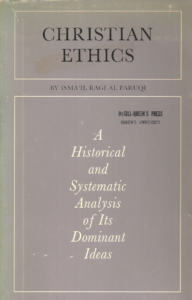
II. Methodological And Doctrinal Distortions
A. Jesus’ Interiorization of Law
In part 1/3, I highlighted some problems with Faruqi’s methodology as its premises give a distorted reading of Christianity and skew the evidence in favor of Islam. The distortions become evident when Faruqi seeks to rewrite the history of the mission and ministry of Jesus through the lens of his metareligion. Faruqi, like all Muslims, maintains a respectful attitude towards Jesus. At the same time he is persuaded that the “real” Jesus is not that of historic Christianity. For Faruqi, the real Jesus should be based on results of German historical critical method and Quranic sources. One cannot help but notice the irony when Faruqi (and other Muslim apologists) unreservedly appropriates the skeptical results of the historical critical method to critique the bible while at the same time eschewing any application of the same critical method in the study of the Quran.
Faruqi has taken considerable effort to familiarize himself with the works of critics like Joseph Klausner and C. H. Dodd. Unfortunately, his appropriation of historical research is selective and subordinated to an overriding and debatable presupposition that Jesus’ pristine religion was solely aimed at effecting an internal correction of the Jewish legalistic religion. This presupposition allows Faruqi to dismiss any Biblical teaching which he finds personally unpalatable to the corrupting influence of Jewish racialism. Jewish racialism was undeniably a harsh reality in Faruqi’s personal experience. After all, he had to abandon his role as governor of a Palestinian district when the Jews won their War of Independence in 1948. But one wonders if Faruqi has in this matter allowed his unfortunate experience to color his judgment when he analyzes the Bible. Continue reading “A Critique of Ismail Faruqi’s Metareligion and Ethical Analysis of Christianity. Part 2/3”